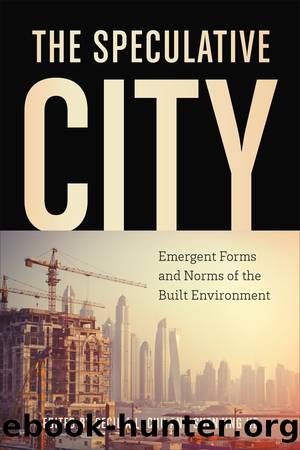The Speculative City by Cecilia L. Chu & Shenjing He

Author:Cecilia L. Chu & Shenjing He
Language: eng
Format: epub
Tags: Federal government – Canada
Publisher: University of Toronto Press
Informal Finance: Mobilizing Capital, Cementing Social Relations
Beginning with Hartâs (1970, 1973) pioneering studies of the âinformal economy,â scholars have argued that so-called informal activities enable large segments of society, particularly in developing-world settings, to survive and sometimes even to thrive. Because the original conception of the informal sector challenged the economic and social marginality frequently ascribed to the poor, it stimulated a vigorous debate on relations between capital and labour, and between development and market regulation, as well as on the role of policy in managing housing, employment, and much else. Awareness of informal economies also brought into question bedrock assumptions in political economy regarding the necessity of clear property rights and labour contracts, while simultaneously underscoring the social embeddedness of economies. Given how informality cuts to the core of long-standing political-economic debates, it has inspired vociferous reactions from many angles (Portes & Haller, 2005). For some, informality is seen as a means to justify the flexibilization of poor-country labour forces (Peattie, 1980), while for others it provides evidence of a laudable entrepreneurial verve with the potential to ignite economic development (De Soto, 1989). Additional studies of informal finance have focused on the relative merits and risks of non-bank lending and usury in places underserved by formal financial institutions (see Adams & Fitchett, 1992). Striking a middle ground, Castells and Portes argue that the informal economy âencompasses flexibility and exploitation, productivity and abuse, aggressive entrepreneurs and defenseless workers, libertarianism and greedinessâ (1989, p. 12).
In China, informal finance has recently garnered considerable attention from scholars and policymakers. The new attention paid to informal finance is rooted in the vital role it has played in supplying capital to the private sector since the outset of market reforms in 1978 and in recognition of its significant scale, estimated at around 7 per cent of total outstanding domestic bank loans, or 3.8 trillion yuan, in 2011 (Mao & Luo, 2011). The vibrancy of informal financial markets in China coexists uneasily, however, with the central governmentâs strong desire for macro-economic control and social stability. Consequently, governments at various levels have exhibited inconsistent approaches to usurious lending practices. Local governments directly charged with overseeing finance as well as economic development have been especially erratic in their approach to informal financing activities: supportive to the extent that it provides capital for growth, and antagonistic during the inevitable episodic crisis moments.
Under current law, individuals, groups, and firms are forbidden from accepting deposits from the public, while loans between individuals and firms are legal, as are âmutual assistance associationsâ (huzu hui), sometimes known as rotating credit and savings associations (ROSCAs). Article 28 of the âProvisional Regulations of the PRC on Bank Oversightâ states: âLocal governments are not permitted to establish banks. Individuals are not allowed to establish banks or other financial institutions, nor to conduct financial business.â In practice, grey areas abound within the legal framework and regulations governing non-bank finance; ROSCAs sometimes evolve into underground banks, bank loans are sometimes diverted into informal lending circuits, and so forth. Separation of the formal and informal is far from complete and permanent.
Download
This site does not store any files on its server. We only index and link to content provided by other sites. Please contact the content providers to delete copyright contents if any and email us, we'll remove relevant links or contents immediately.
Kathy Andrews Collection by Kathy Andrews(10519)
The remains of the day by Kazuo Ishiguro(7551)
Spare by Prince Harry The Duke of Sussex(4195)
Paper Towns by Green John(4169)
The Body: A Guide for Occupants by Bill Bryson(3799)
Be in a Treehouse by Pete Nelson(3211)
Harry Potter and the Goblet Of Fire by J.K. Rowling(3041)
Goodbye Paradise(2961)
Never by Ken Follett(2879)
Into Thin Air by Jon Krakauer(2700)
The Remains of the Day by Kazuo Ishiguro(2617)
The Genius of Japanese Carpentry by Azby Brown(2608)
The Cellar by Natasha Preston(2594)
Drawing Shortcuts: Developing Quick Drawing Skills Using Today's Technology by Leggitt Jim(2532)
120 Days of Sodom by Marquis de Sade(2435)
Architecture 101 by Nicole Bridge(2350)
The Man Who Died Twice by Richard Osman(2297)
Machine Learning at Scale with H2O by Gregory Keys | David Whiting(2287)
Fairy Tale by Stephen King(2067)
